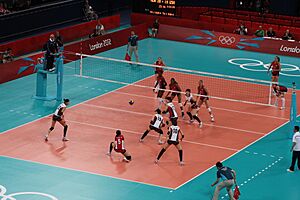Volleyball at the Summer Olympics facts for kids
Quick facts for kids Volleyball at the Summer Olympics |
|
|---|---|
 |
|
| Governing body | FIVB |
| Events | 2 (men: 1; women: 1) |
| Games | |
|
|
|
|
Volleyball is a popular sport at the Summer Olympics. Both men's and women's teams have competed regularly since the 1964 Games.
Some countries have won many gold medals. For men, Brazil, the United States, and the former Soviet Union have won gold multiple times. Other countries like Japan, Poland, and France have also won.
In women's volleyball, gold medals are won by fewer countries. Only six nations have won gold. These include Brazil, Cuba, China, Japan, the United States, and the former Soviet Union.
Contents
Volleyball's Olympic Journey
How Volleyball Joined the Games
Volleyball first appeared at the 1924 Summer Olympics in Paris. It was a special show event, not an official competition. After World War II, the sport grew. The FIVB (the world volleyball federation) was created.
In 1957, a tournament was held in Sofia, Bulgaria. This event helped show that volleyball was ready for the Olympics. It was a big success! So, volleyball officially became an Olympic sport in 1964. The International Olympic Committee tried to remove it for the 1968 Games. But people protested, and volleyball stayed.
Changes to the Game Format
The first Olympic volleyball tournament was simple. All teams played against each other. Then, they were ranked by wins and points. This system had a problem. Sometimes, the medal winners were known before all games finished. This made the last games less exciting for fans.
To fix this, a "final round" was added in 1972. This new system included quarterfinals, semifinals, and finals. It is now called the "Olympic format." It is still used today.
More teams have joined the Olympics over the years. Since 1996, 12 nations compete in both men's and women's indoor events. Every major volleyball region in the world has at least one team in the Olympics.
Olympic Volleyball Events Over Time
| Event | 64 | 68 | 72 | 76 | 80 | 84 | 88 | 92 | 96 | 00 | 04 | 08 | 12 | 16 | 20 | 24 | Years |
|---|---|---|---|---|---|---|---|---|---|---|---|---|---|---|---|---|---|
| Men's tournament | X | X | X | X | X | X | X | X | X | X | X | X | X | X | X | X | 16 |
| Women's tournament | X | X | X | X | X | X | X | X | X | X | X | X | X | X | X | X | 16 |
| Total | 2 | 2 | 2 | 2 | 2 | 2 | 2 | 2 | 2 | 2 | 2 | 2 | 2 | 2 | 2 | 2 |
Men's Volleyball Champions
The Soviet Union won the first two Olympic volleyball tournaments. Japan won gold in 1972. In 1976, Poland won gold. They used a new attack called the back row attack.
In 1980, the Soviet Union won their third gold medal. The United States won in 1984. They beat Brazil in the finals. Italy won their first medal that year. In 1988, the United States won again. Star players Karch Kiraly and Steve Timmons helped them win.
In 1992, Brazil won their first Olympic title. They surprised many by beating strong teams. The Netherlands won in 1996. Italy has been strong but has not won a gold medal yet. In 2000, Serbia and Montenegro won gold.
Brazil won their second gold in 2004. They beat Italy in the final. This showed they were a top team. In 2008, the United States won their third gold. They beat Brazil in the final. Russia won the bronze medal. In 2012, Russia made a big comeback to win gold against Brazil. Dmitriy Muserskiy scored a record 31 points in the final.
In 2016, Brazil won their third gold medal at home. They beat Italy in the final. The United States won bronze. The 2020 tournament (played in 2021) saw France win gold. They beat the Russian team.
The gold medals in men's volleyball are spread out. The former Soviet Union, United States, and Brazil have three titles each. Other countries have won once. Italy is a strong team but still hopes for a gold medal.
Women's Volleyball Champions

Japan won the first women's Olympic volleyball tournament in 1964. The Soviet Union then won two golds in a row, in 1968 and 1972. Japan won again in 1976.
In 1980, the Soviet Union won their third gold. In 1984, China won gold. They beat the United States in the final. In 1988, the Soviet Union won a dramatic final against Peru.
In 1992, Cuba became a new strong force. Led by stars like Mireya Luis and Regla Torres, Cuba won three gold medals in a row. They won in 1996 and 2000 as well.
In 2004, China won gold again. Russia came in second. In 2008, Brazil finally won their first gold. They beat the United States in the final. Brazil won again in 2012, beating the United States once more.
In 2016, Brazil was favored to win at home. However, a young Chinese team surprised them in the quarterfinals. China went on to win their third Olympic title. Their coach, Lang Ping, became the first person to win gold as both a player and a coach. In the 2020 Games (held in 2021), the United States won their first gold medal. They beat Brazil in the final.
How the Competition Works
The Olympic volleyball tournament has a clear set of rules.
- Twelve teams play in each event.
- The country hosting the Olympics always gets to play.
- Two teams qualify through the Men's and Women's World Cup.
- Five teams qualify by winning tournaments in their own regions (continents).
- The last four spots are decided in world qualification tournaments.
Playing the Games
- First, teams are put into two groups of six teams. This is called the qualification round.
- Each team plays every other team in its group once.
- The top four teams from each group move on to the next stage. The other two teams leave the competition.
- The second stage is called the final round. It has quarterfinals, semifinals, and finals.
- Matches in the final round are set up based on how teams did in the first round. For example, the best team from Group A plays the fourth-best team from Group B.
- Winners of the quarterfinals play in the semifinals.
- Winners of the semifinals play for the gold medal. The losers play for the bronze medal.
- Teams can only have twelve players. No new players can join, even if someone gets hurt.
Men's Tournament Medals
Medal Table
| Rank | Nation | Gold | Silver | Bronze | Total |
|---|---|---|---|---|---|
| 1 | 3 | 3 | 0 | 6 | |
| 2 | 3 | 2 | 1 | 6 | |
| 3 | 3 | 0 | 2 | 5 | |
| 4 | 1 | 1 | 2 | 4 | |
| 5 | 1 | 1 | 1 | 3 | |
| 6 | 1 | 1 | 0 | 2 | |
| 7 | 1 | 0 | 1 | 2 | |
| 8 | 1 | 0 | 0 | 1 | |
| 1 | 0 | 0 | 1 | ||
| 10 | 0 | 3 | 3 | 6 | |
| 11 | 0 | 1 | 1 | 2 | |
| 12 | 0 | 1 | 0 | 1 | |
| 0 | 1 | 0 | 1 | ||
| 0 | 1 | 0 | 1 | ||
| 15 | 0 | 0 | 2 | 2 | |
| 16 | 0 | 0 | 1 | 1 | |
| 0 | 0 | 1 | 1 | ||
| Totals (17 entries) | 15 | 15 | 15 | 45 | |
Women's Tournament Medals
Medal Table
| Rank | Nation | Gold | Silver | Bronze | Total |
|---|---|---|---|---|---|
| 1 | 4 | 2 | 0 | 6 | |
| 2 | 3 | 1 | 2 | 6 | |
| 3 | 3 | 0 | 1 | 4 | |
| 4 | 2 | 2 | 2 | 6 | |
| 5 | 2 | 1 | 2 | 5 | |
| 6 | 1 | 3 | 2 | 6 | |
| 7 | 0 | 2 | 0 | 2 | |
| 8 | 0 | 1 | 1 | 2 | |
| 9 | 0 | 1 | 0 | 1 | |
| 0 | 1 | 0 | 1 | ||
| 0 | 1 | 0 | 1 | ||
| 12 | 0 | 0 | 2 | 2 | |
| 13 | 0 | 0 | 1 | 1 | |
| 0 | 0 | 1 | 1 | ||
| 0 | 0 | 1 | 1 | ||
| Totals (15 entries) | 15 | 15 | 15 | 45 | |
Overall Medal Count
- Countries that no longer exist are shown in italic.
Sources:
| Rank | Nation | Gold | Silver | Bronze | Total |
|---|---|---|---|---|---|
| 1 | 7 | 4 | 1 | 12 | |
| 2 | 5 | 4 | 2 | 11 | |
| 3 | 4 | 3 | 4 | 11 | |
| 4 | 3 | 3 | 3 | 9 | |
| 5 | 3 | 1 | 2 | 6 | |
| 6 | 3 | 0 | 2 | 5 | |
| 7 | 1 | 3 | 2 | 6 | |
| 8 | 1 | 1 | 0 | 2 | |
| 9 | 1 | 0 | 2 | 3 | |
| 10 | 1 | 0 | 1 | 2 | |
| 11 | 1 | 0 | 0 | 1 | |
| 12 | 0 | 3 | 3 | 6 | |
| 13 | 0 | 2 | 0 | 2 | |
| 14 | 0 | 1 | 1 | 2 | |
| 0 | 1 | 1 | 2 | ||
| 0 | 1 | 1 | 2 | ||
| 17 | 0 | 1 | 0 | 1 | |
| 0 | 1 | 0 | 1 | ||
| 0 | 1 | 0 | 1 | ||
| 20 | 0 | 0 | 2 | 2 | |
| 21 | 0 | 0 | 1 | 1 | |
| 0 | 0 | 1 | 1 | ||
| 0 | 0 | 1 | 1 | ||
| Totals (23 entries) | 30 | 30 | 30 | 90 | |
Top Players in Each Olympic Game
Men's MVP Awards
|
Women's MVP Awards |
See also
 In Spanish: Voleibol en los Juegos Olímpicos para niños
In Spanish: Voleibol en los Juegos Olímpicos para niños
- Beach volleyball at the Summer Olympics
- List of Olympic venues in volleyball
- List of indoor volleyball world medalists
- Volleyball at the Summer Paralympics
 | Stephanie Wilson |
 | Charles Bolden |
 | Ronald McNair |
 | Frederick D. Gregory |

